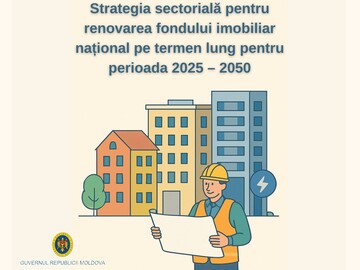
The Moldovan government has approved the National Building Stock Renovation Strategy until 2050, which will require investments of €4 billion
According to the Ministry of Energy, the sectoral National Building Stock Renovation Strategy for 2025-2050 and the Roadmap for its implementation were developed with the support of UNDP in Moldova, the Energy Community Secretariat, the European Union, and the Government of Denmark. The goal of the document is to improve the energy efficiency of public, private, and residential buildings in Moldova by 2050, which will contribute to the transformation of all existing buildings into buildings with virtually zero energy consumption. According to Energy Minister Dorin Junghietu, more than half of the energy consumed in our country is accounted for by the construction sector. He said that the energy efficiency of buildings benefits both individuals and society as a whole. Reducing energy consumption will allow residents to pay less and have more money for other important needs. “At the same time, renovating buildings contributes to increased thermal comfort, improved living conditions, and increased building safety,” he said. According to the Ministry of Energy, based on data on the area of the existing building stock, 87% is occupied by the residential sector and only 13% by non-residential buildings. The vast majority of these buildings are old and energy inefficient. About three-quarters were built before 1990, when thermal insulation requirements for buildings were limited and less stringent. Among non-residential buildings, commercial buildings account for the largest heated area, about 31%, followed by educational institutions and restaurants, 19% each, office buildings, 13%, medical facilities, 9%, etc. The document proposes a three-stage renovation plan: minor (energy savings of up to 30%), moderate (30-60%), and major (more than 60%). It is planned that investments in energy efficiency will also have a positive impact on the architectural appearance of buildings and will contribute to an increase in their market value. In addition to the direct benefits for residents, these investments have an important economic effect, from creating new jobs in construction, engineering, and other related fields to strengthening the country's energy security by reducing dependence on external energy sources. The government notes that improving the energy efficiency of buildings is a national strategic priority. According to the National Building Stock Renovation Strategy for 2025-2050, approved by the Cabinet of Ministers, over the next 25 years, it is planned to renovate about 75% of the total area of residential buildings and reduce energy consumption by 40%. The planned actions include thermal insulation of walls and roofs, modernization of heating and ventilation systems, and replacement of windows and doors. In buildings connected to centralized heating, the vertical distribution system will be replaced by a horizontal one, and individual heat meters will be installed. This will enable consumers to pay less for heating. At the same time, the renovation of the National Building Stock will contribute to reducing carbon emissions, which will have a positive impact on the environment. To implement the strategy over the next five years, the government has allocated €405 million in financial resources from the state budget, external sources, and private investments. In the long term, the Cabinet of Ministers will continue to attract external financing and create mechanisms to encourage private sector participation. The Ministry of Energy notes that achieving national energy efficiency goals requires significant investment. An analysis of the current project portfolio shows that funding is provided mainly by development partners and the state budget, but these resources are insufficient compared to the scale of the problems identified. The implementation of the National Building Stock Renovation Strategy will require a total investment of approximately €4 billion 393.8 million, of which approximately €405 million has already been raised through various government-initiated programs/projects. Thus, in order to cover the investment gap, which is estimated at approximately €4 billion by 2030, it is extremely important to mobilize private capital and create mechanisms to encourage private sector participation. // 17.09.2025 — InfoMarket.







